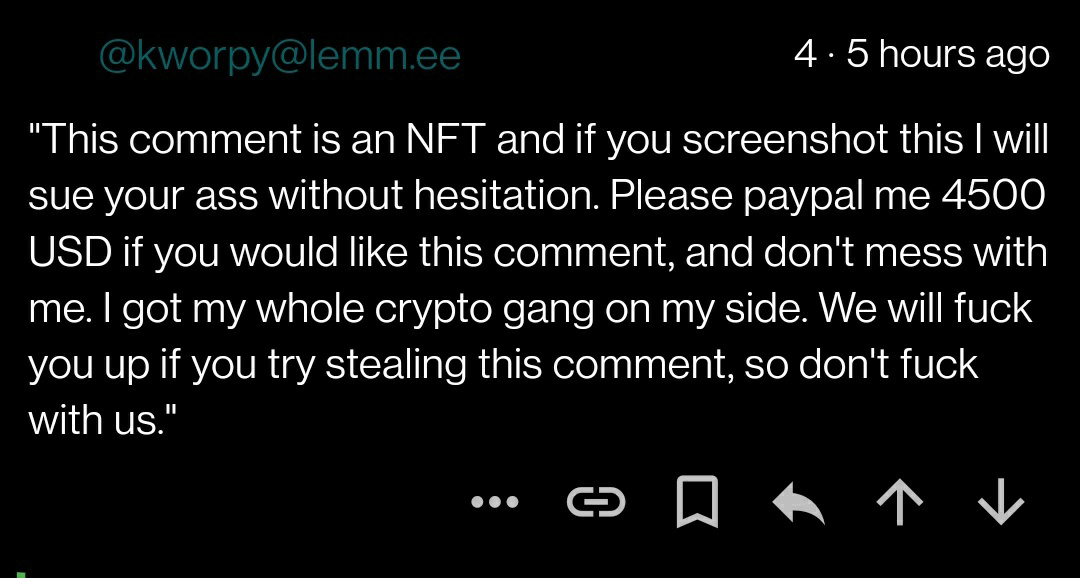It’s not even the picture, it’s the promise you own a picture
Imagine waving the receipt of your brand new TV you don’t have in your home around in public for prestige
It’s more like you have a receipt for a link of where to get the manual for the TV.
And the picture itself is just a randomly generated picture of a money or a picture of Donald Trump photoshopped into something from the first page of Google images.
Holding an NFT can give you ownership of an image. If you have a bored ape NFT you own some legal rights to the image.
That’s because of contract law, and IP law. A contract assigns the copyright to the holder of the NFT, and governments enforce legal contracts.
The only thing that gives NFTs any claim to value is the fact that a centralized authority can enforce it. The entire concept behind the decentralized leaderless authority of the blockchain is a myth.
“You own the image“ functionally doesn’t mean anything in the context of NFT’s because the image component in an NFT is not actually exchanging hands so there’s nothing to truly enforce here. It doesn’t grant exclusive rights and all that comes with it, it just gives them ownership rights - an artist can’t say the owner can’t use it for their own purposes. People can screenshot it, make memes of that, etc. and you have no legal recourse because you do not have exclusive rights to the actual work. They did nothing that violates your ownership. The NFT is you have a receipt that nobody can dispute that says “I own this receipt associated with this image and can use it as such.”
When I shoot video and give people a screener, I watermark it and have legal rights to the image/video content itself. They cannot duplicate it or use it in any fashion without risking legal action by me against them. NFT’s do not have that same protection. I can screenshot a bored ape image that someone “owns,” barely augment it, and mint a new NFT with no repercussions from the person who bought the original NFT. The original artist could come after me potentially because they have the actual exclusive rights to the creation, which again does not transfer with an NFT purchase.
In addition, you don’t even own the means to protect the receipt. If the blockchain goes down, your receipt is meaningless and you don’t even have exclusive rights to the image to sell or license out.
To give one more example: if I buy a video game, I have certain ownership rights associated with that disk. This is assuming physical copies of course. I can do whatever I want with that physical copy within the bounds of ownership of a distributed IP. I can snap it in half, I can back it up to a drive, etc. What I cannot do is make copies and distribute it because I have no rights to the IP, it has not been transferred to me with the purchase. The developer/publisher still has exclusivity, they control the IP. And if somebody else makes copies of my gave to be distributed, I have no legal recourse. This is really the key factor here. That law they’re breaking is not about my ownership, it’s about the game developer and publisher’s rights to the IP. They are the only ones who have legal recourse. NFTs, it’s the same way. The artist has all of the legal protections that come with IP ownership. Not the person who bought an NFT of the artwork.
TL;DR: NFT’s are buying receipts. They’re roughly as useful as “a certificate of authenticity“ they comes bundled with collectors items that were sold on infomercials in the 90s and 2000s. Except you don’t even get to store the certificate yourself, you’re dependent on somebody else
Yeah you can own an NFT but you can own any image through a license agreement with the owner.
Yes… That’s the point of my comment.
Shes right an nft is a hallway to the picture. You don’t even own to picture
I thought NFTs is the title to the car. Just a title without any law backing it up.
No, because an NFT just tells you were the picture is on the block chain. In theory If you had access to the block chain and another picture you can just change the picture stored at that point
In theory If you had access to the block chain and another picture you can just change the picture stored at that point
In theory if you had access to your bank’s safe you could just take out money.
Well, you dont.
In the US money is insured. You will get your money back
The point was that if you had access to it, you could do some bad stuff but you wont ever have access to it.
You cant have access to the blockchain so you couldnt change anything. Saying “if i had access to the blockchain,…” is like saying “if I had access to your stuff, I could steal it”. Yeah, thats right but that doesnt mean anything…
Some hacker needs to make it a mission to replace every Bored Ape and Trump Card NFT with Goatse.
No they aren’t NFTs are recipts. That is all they are. They can have a connection to images or physical goods but they only proove that you bought a recipt and not actual ownership.
so a deed to a house only proves that you bought a piece of paper, right?
No a deed to a house has legal meaning. So it’s not at all like a deed to a house.
Sort of except it means nothing. It’s like having a deed with absolutely no legal weight.
If I buy a microwave and try and return it with only the receipt they won’t give me a refund because I only bought the receipt. I could sell the receipt, sure it says you bought it but I am keeping the microwave.
If the deed was scribbled with crayons by a hobo and the house would be imaginary. That would be comparable to NFTs.
Actually NFTs aren’t even pictures xD
Imagine buying a hyperlink 😭
Hey, domain names are a thing you know
That’s more of an address book provided by DNS.
Hey at least then you own a domain name and all of its subdomains and can make them point whatever you want and host whatever you want out of them. When you buy an NFT you own one URL on an image hosting site, whose content you don’t even control.
You rent domain names. Stop paying the fee and you don’t get to use them anymore.
fair enough, but $12/yr for something I can do whatever I want with vs several grand once for an immutable monkey JPEG that i cannot do anything with except sell to someone else…
Nope! Not even that. Just an agreement between the scam arti- sorry, seller and the dumbfuc- sorry, buyer, that the rights to something have changed hands. Nothing more, nothing less.
“This comment is an NFT and if you screenshot this I will sue your ass without hesitation. Please paypal me 4500 USD if you would like this comment, and don’t mess with me. I got my whole crypto gang on my side. We will fuck you up if you try stealing this comment, so don’t fuck with us.”
Oops

Why are they asking for fiat currency?
“This comment is an NFT and if you screenshot this I will sue your ass without hesitation. Please paypal me 4500 USD if you would like this comment, and don’t mess with me. I got my whole crypto gang on my side. We will fuck you up if you try stealing this comment, so don’t fuck with us.”
NFTs are just USED for pictures. They actually had potential to solve real world problems, but jetzt isch d Katz de Bååm nuff as we say in hohenlohe.
NFTs
Note: this is how you spell it. Apostrophes are for possession & contraction …not making words plural.
That’s not true, clearly an apostrophe means: “watch out, here comes an s!”
What about for the Goa’uld?
That’s not true. Apostrophes can be used to make acronyms plural, and there are cases where not doing so is clearly wrong (e.g. Oakland A’s)
No style guide says this. The only exception I have ever seen is single letters, and even that is up to interpretation.
Came here to say this. It’s a silly way to look at it, but these dorks are basically saying “no, using the ‘internet’ is not going to catch on silly techies.” It’s a kind of technology, not a vehicle specific to capitalism or big funds. NFTs could be proof of ownership over anything.
Consumers want true ownership, even if it requires a kind of tokenized-receipts system.
To be fair most art is just pictures (using the term picture loosely). That’s not why the nft is dumb.
Cryptobros incoming to tell us all the real-world problems blockchain’s going to solve any day now in 3… 2…
I got 99 problems, but a blockchain solves none
My desire for drugs
The point of blockchains is decentralization, and as Lemmy users we know that decentralized services are difficult to make popular, even if they’re an improvement over their competitors.
This^
They’re not even pictures. They’re hyperlinks to pictures that may or may not even be there.
Famously, it’s uncommon that your “NFT” ends up hyperlinking to a picture of a rug because the people running it know it’s a scam.
They are actually not hyperlinks, more like certificares of ownership over a picture (or a “token”, as the name suggests)
It’s very expensive to add the actual image picture into the blockchain, so most NFTs actually contain a hyperlink and the NFT owner “owns” (because to my knowledge there’s no legal base to assert ownership) only that hyperlink within their token, not the image itself.
Thats true but they also usually contain things like the pictures hash so as long as you have the file you can always claim it (even if the hyperlink becane invalid).
Pretty much any kind of data related to the image is useless for verifying the actual image. For instance saving the exact same image with a different compression algorithm will make a new hash.
Go away, feddit de you never have anything useful to say
Oh yes, generalizing. At least you didnt write any racist jokes (yet)…
Crypto
BrosLosers would be really mad at reading that, if they weren’t busy fellating the owners of BoredApes after they made them blind.…
What? No, that’s not a joke.
https://www.theverge.com/2023/11/6/23948464/bored-ape-nft-event-eye-injury-sunburn-uv-exposure
“Had a good time with the homies who also got their eyes burned”. These people are unbelievably down there in the pathetic human scale.
What the fuck. I’ve been to many, many clubs and shows with creative lighting, and never once heard of or experienced a problem like this. This had to be reckless ignorance on the event planners to result in something like this. Holy shit.
NFT Bros 🤝 Twitter Artists
Seething about their jpegs being stolen
I think NFT’s had some promise for stuff you actually have to own (not some ape pictures). Like a digital version for maybe an invitation or tickets or if done properly (by your countries government for example) maybe even for stuff like licenses (i.e. driving license, welding license etc.) Or identification (passport, id, etc.)
For government documents you need nothing but a plain old certificate to create a digital signature. If there is a single instance of trust (such as a government) there absolutely no point in using a blockchain.
Decentral NFTs for concert tickets would only make sense if you were looking for a solution to liberate the second market, i.e. people selling tickets to other people without involvement of the host of the concert. Such a model is neither beneficial for the hosts (as they wouldn’t benefit from the second market sales) nor the visitors (as the second market typically leads to even higher prices). If you meant a way to return/trade tickets on a platform controlled by the host / the original issuer of the tickets, then there’s again no need at all for crypto aside plain old, stupid certificates.
Even in single instances of trust there can be advantages to using blockchain for those applications:
- Decentralization can give you better uptime/availability of those documents. If the DMVs website or authentication service goes down, documents can still be authenticated since they and/or their signatures stored in a distributed manner. The internet can go down at your bar but if you have a recent copy of a chain, you can still verify somebody’s ID.
- It can make them easier to transfer between parties, and creates a digital “paper trail” which can conform to whatever requirements one might have. For example, you could easily require several parties to sign off any time the document is moved or assigned to a new person.
- You can use those documents and their signatures with smart contracts or other decentralized apps. For example, you could sign up for an account at a bank or a platform like eBay using your NFT’d digital ID and the bank could accept it would needing to manually verify if the id “looks fake” or if your blurry phone picture is going to cut it. They don’t have to call up the government and ask them to verify it or pay some third party to match your address against their database of known people, etc.
- Maybe you need better transparency in how many documents are issued and (potentially) to whom. Voting systems, for example, are a use case for this. It could be used for shareholder governance structures, etc.
- Blockchains can enforce rules which centralized entities can’t, which is important to consider. An example of how this is useful: imagine the government has a digital ID system and it’s run in a centralized fashion, which makes sense, because they are the issuing authority right? Now imagine that centralized system gets hacked and an attacker starts printing and authenticating a bunch of fake ID requests. In the time between when this attack happens and when somebody figures it out, which could be hours to days, banks and other entities could be relying on those fake documents and potentially lose millions. An example of a rule a blockchain can enforce is “this ID issuing authority cannot issue in a single day more than 10% above it’s daily average of issuances over a six month period”, limiting the scope of an attack. One may say “Well, but blockchain can be hacked too!” which is true, but it’s less likely because the software for these networks has thousands of eyes on it whereas there may only be a couple system admins approving changes to your state-run ID database. Open source software is more secure than proprietary for this reason. Additionally, a security flaw needs to effect 51% of the network which isn’t likely to happen when you have a diversity of software versions.
- Many smart contracts need ways to protect against sybil attacks (ie one person pretending to be multiple). Quadratic funding being used for charity fundraising is a perfect example. By using credentials issued on chain by centralized authorities, they can verify a person is not multiple people. Quadratic funding is an awesome way to fund public goods.
Every single one of the examples you gave relies on some single centralized authority to give it value. Passports and licences are meaningless without a government. Tickets rely on the venue.
I have not heard anyone mention any application for NFTs that would work better than a database run by the agency that is required to give the document value.
Blockchain is a solution in search of a problem.
The problem IS the centralized authority. Can you forever trust a government to not artificially inflate or deflate the value of a currency? The whole point was to have a system with no single authority. No single point of failure.
It is, however, not perfect. The volatility, limited number of transacrions per second , and reliance on an incredible amount of energy expense were the largest of these when the original bitcoin concept was created. Some of these issues have solutions, but its still an evolving technology.
I personally view crypto and the crypto boom as an experiment in unfettered capitalism - it’s still a new technology, the governments haven’t caught up to it yet so no regulations, yet quite literally 99% of crypto usage was in trying to take advantage of others (scams) and speculation.
The only thing with actual value that came out of crypto was probably Monero, which allowed for completely anonymous payments, something that crypto, when paired with crypto exchanges, is bad at.
Maybe I’m not very knowledgable, but even Monero seems sketchy to me. I’ve clicked into what I thought were blogs about privacy that ended up being sites that exist only to promote Monero, once you look into them. That and the way certain accounts will do nothing but praise Monero just seems very greasy to me. I also wonder how it solves some of the other problems inherent to crypto, such as the environmental concerns.
For things like drugs like the person mentioned below, I don’t think I’d trust someone who didn’t just use cash.
The level of the NFT craze was kind of wild though. I remember watching this Hot Ones interview with Mila Kunis where she mentioned “connecting with the audience through NFTs” and “the audience owns the art to the show”.
https://youtu.be/NAeOzDhL6tc?t=1m55s
At the time I remember thinking that I don’t really understand how that would work in practice or what value NFTs really bring to this situation. I just assumed I didn’t understand. Turns out…nobody did. It’s just a bunch of bullshit.
Here is an alternative Piped link(s):
https://piped.video/NAeOzDhL6tc?si=it3vFINprPvt8ExV?t=115s
Piped is a privacy-respecting open-source alternative frontend to YouTube.
I’m open-source; check me out at GitHub.
That being if you can get yourself some Monero anonymously. I can see valid use cases for that, for example in the drug busines…
Onion routing (like Tor) is the default for the Lightning Network. Every crypto that supports it already has private payments, including Bitcoin.
There’s no way to validate the total supply of Monero. So if it ever has a supply bug (like Bitcoin’s value overflow incident), then it won’t be detected and patched.
Monero has mechanisms for validating supply:
https://m.youtube.com/watch?v=vW9H6VIONWM&t=174s
If you’re going to repeat this argument ad nauseam then at least don’t do it in a misleading absolutist way.
I don’t 100% disagree with him. Like he said, it is an additional risk. Assuming no supply bugs, you can validate what is published.
I just disagree with him that it’s “near zero probability”. This already did happen with Bitcoin and we only caught it because we weren’t assuming zero supply bugs. Bugs happen and we’re talking about the future money supply for all humans.
Edit to add: and BTW it’s not just cryptography bugs (rare), but anything related to validation (like value overflow)
Here is an alternative Piped link(s):
https://m.piped.video/watch?v=vW9H6VIONWM&t=174s
Piped is a privacy-respecting open-source alternative frontend to YouTube.
I’m open-source; check me out at GitHub.
NFT’S
Stay in school, kids.
I twitch every time I see a basic English error in a meme.
OP, I’ll buy it for eleventy billion and one spiff coins.

















